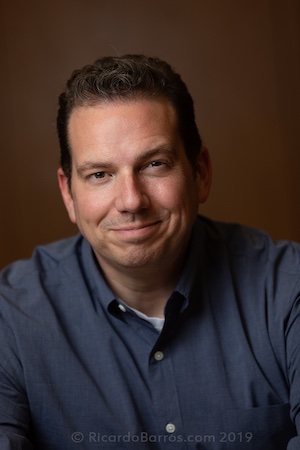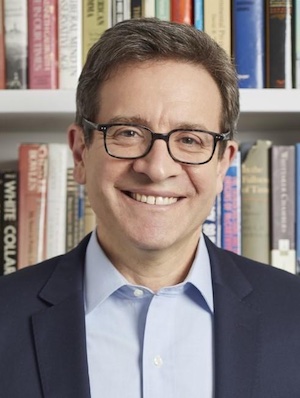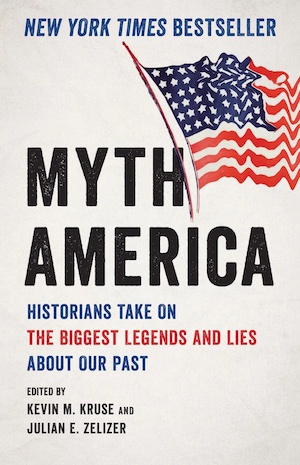By Rachel Hess
Like beauty, historical truths also seem to be in the eye of the beholder. Some popular ‘truths’ that historians, professors, and editors Kevin M. Kruse (ΦBK, University of North Carolina at Chapel Hill) and Julian E. Zelizer (ΦBK, Brandeis University) debunk in their anthology, Myth America: Historians Take On the Biggest Legends and Lies About Our Past. While history is based on fact, it is also subject to intense scrutiny and interpretation that varies depending on political agenda. The way history is viewed is not static, but it is influenced by societal values, experiences, and landscape.
Zelizer, a professor of history and public affairs at Princeton University, traced his passion for the project back to his studies of American political history at Brandeis University. There, he worked on a two-year research project examining Massachusetts liberalism. He became captivated by his research, and now is an accomplished undergraduate and graduate professor, writer about the United States since the 1960s, and commentator for CNN as a political analyst, NPR as a contributor, and for other publications.
Myth America sheds light on some of the most pernicious American political and historical lies. The anthology, structured with 20 essays from prominent historians, aims to challenge historical misconceptions through well-founded research and dispel inaccurate narratives perpetuated by disinformation, misinformation, and propaganda. Zelizer commented that the “huge amounts of basic disinformation about American history in the public sphere or arguments that were fundamentally disconnected from what generations of professional historians have written based on their research” instigated the need for their volume. The editors sought to provide this information in a straightforward, digestible manner for the general public, recognizing the urgency in combating misinformation amplified by social media. Kruse, a professor of history at Princeton University, added that they compiled works from various authors because they had a large number of topics to cover and needed to recruit other experts to tackle all of the issues and combat misinformation effectively. The topics covered range from America’s founding, the New Deal, the Civil Rights Movement, voter fraud, as well as sociopolitical issues regarding immigration, feminism, police violence, and more.


Although, as demonstrated in the book, many of these myths are not new, they can be particularly dangerous with the age of social media. Specifically, Zelizer acknowledged the lack of filtering and fact-checking information, which makes a book that contests uncontested narratives quite timely. Moreover, Kruse underscored the book’s urgency by mentioning that an understanding of history shapes interpretations of the present and future political, sociocultural, and economic decisions, strategies, and actions. Thus these distorted and reinvented lies created to embolden specific political agendas have the potential to inspire significant harmful policies.
Commenting on the importance of a liberal arts education in a time of dis and misinformation, Zelizer said, “A good liberal arts education at its best can teach students to think critically and to evaluate arguments based on evidence and the quality of analysis. Those are the tools we need more than ever to deal with the challenges we face.” Moreover, these students will be the ones reading, learning, teaching, and writing history. Foundational to democracy and empowerment, “a good education is essential to a strong civic culture and economic mobility,” argued Zelizer. Educating the public and equipping individuals with tools for information assessment is critical to combating widespread perennial lies, evaluating arguments and beliefs, and forming evidence-based rational conclusions. Kruse echoes this sentiment, emphasizing the innumerable skills that history teaches, such as evidence evaluation, argument formation, and persuasive writing, which are all skills that can be applied to any other field. In addition to educational tools, Zelizer remarked that high quality books can dismantle these deeply embedded myths and change attitudes across the political spectrum. Scholarly works do not only address and correct previously held beliefs, but they also reopen the conversation for constructive dialogue and healthy engagement.
While the anthology discusses a wide range of historical and political issues, Kruse asserted that “the collection is by no means exhaustive” and expressed a desire to address additional myths, including those surrounding America’s founding era, American civil religion, and the idea of the birth of a “Christian nation,” as well as the idea of constitutional amendment stipulations that guarantee unlimited individual rights to arms, and more. By recognizing the nation’s flaws, Zelizer and Kruse paint a more realistic picture of the history of the United States, one that showcases its shortcomings without blind nationalism. Yet, they maintain a patriotic outlook, advocating for revisionism as a means to strengthen the nation. Their patriotism is evident in their balance of achievements and flaws and their recognition of “the complexities that are deeply rooted,” as Zelizer said. Acknowledging and correcting a troubling past is the way to make the nation stronger, as Kruse added, “The Constitution was designed to be amended; our political institutions have repeatedly been reformed, sometimes only grudgingly and at great cost, but still reformed. And that ability to begin again, to renew, to revise, is fundamental to the nation and, I’d say, fundamental to any real patriotism.”
Zelizer reflected on his induction into Phi Beta Kappa at Brandeis University, describing it as “a real honor” to be coinciding with the launch of his academic career.
Rachel Hess is a recent graduate of Barrett, the Honors College at Arizona State University, with a degree in political science and Spanish and four certificates in human rights; international studies; peace, religion, and conflict; and political entrepreneurship. She was inducted into Phi Beta Kappa there in April 2022. Arizona State University is home to the Beta of Arizona chapter of Phi Beta Kappa.




